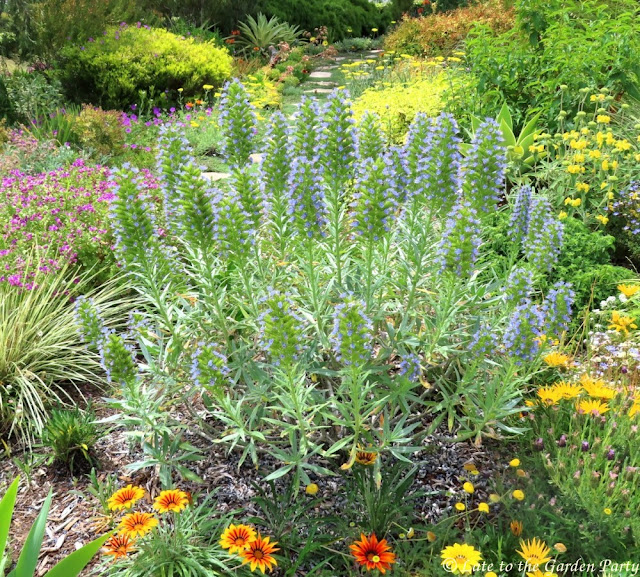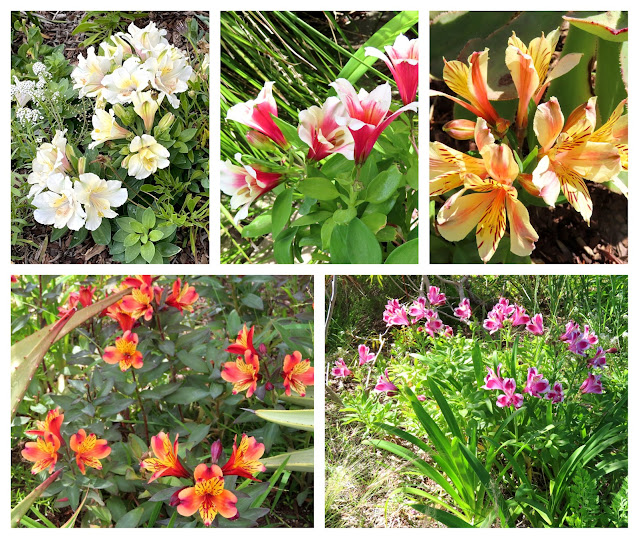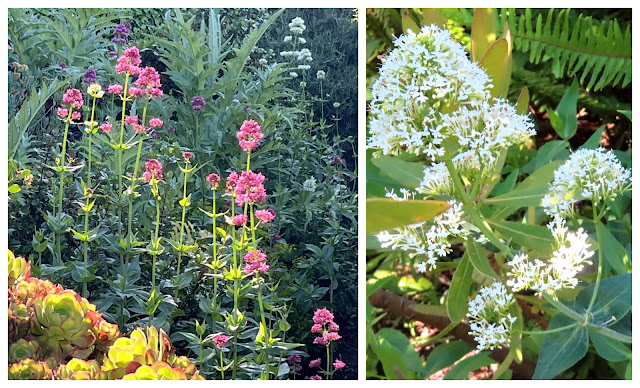Confined to the house during our first wicked heatwave last weekend, I got an early start on my Garden Bloggers' Bloom Day post, which I'm publishing a day before its May 15th schedule. While the heatwave wasn't as bad as some, the sharp surge in temperatures, peaking here at 95F (35C), did take a toll. Fortunately, I caught photos of many plants before they took a hit.
I'll start with a section of the back garden that has been looking particularly nice this spring. It's been flaunting a lot of blue and yellow blooms, with touches of purplish-pink magenta thrown in here and there.
 |
| View of the back garden from the patio area looking south |
Here are closer looks at the individual plants visible in the wider shot:
 |
| Achillea 'Moonshine' is in full bloom, stretching from one bed to another |
 |
| Arctotis 'Large Marge' is prolific in producing flowers, although it requires daily deadheading to keep it tidy |
 |
| Phlomis fruticosa (aka Jerusalem sage) |
 |
| The heatwave has hastened the end of the season for Echium webbii |
 |
| Felicia aethiopica already needs cutting back |
 |
| It seems Polygala myrtifolia (aka sweet pea bush) wasn't bothered by the heat at all |
 |
| Salvia canariensis var candidissima (aka Canary Island sage) responded positively to the extra heat |
 |
| Pelargonium cucullatum, which planted itself below the Salvia, picks up the same color |
 |
| Geranium 'Tiny Monster' echoes the same color a few feet away. Despite its name, 'Tiny Monster' isn't nearly as invasive as the Geranium incanum, which is a troublesome weed in my garden. |
Those plants aren't the only stars of my May garden. There are a lot more than deserve nods of appreciation. For ease of presentation, I'll show these in alphabetical order by genus rather than their location.
 |
| Acanthus mollis |
 |
| Clockwise from the upper left: Alstroemerias 'Claire', 'Inca Lucky', 'Inca Sundance', a noID pink variety, and 'Indian Summer' |
 |
| Calendula officianalis grown from seed |
 |
| Callistemons 'Cane's Hybrid', 'Hot Pink', and viridiflorus |
 |
| NoID Ceanothus hedge |
 |
| Centranthus ruber, including the white form 'Albus' |
 |
| Cistus 'Grayswood Pink' and C. 'Sunset' |
 |
| Cupheas 'Honeybells', 'Starfire Pink', and 'Vermillionaire' |
 |
| Dorycnium hirsutum, now classified as Lotus hirsutus (aka hairy Canary clover) |
 |
| A variety of Gazanias, most self-seeded. The bronze-toned flower on the upper left was a surprise as I've never seen one in that color before. |
 |
Top: Grevilleas 'Moonlight' and 'Peaches & Cream'
Bottom: Grevillea 'Superb' in wide shot and closeup |
 |
| Leptospermum scoparium 'Pink Pearl' |
 |
Top row: Leucospermums 'Brandi Dela Cruz' and 'Spider Hybrid'
Middle: Leucospermum 'High Gold'
Bottom: Leucospermum 'Sunrise' |
 |
| Oenothera speciosa (aka pink evening primrose) |
 |
Top row: Pelargonium peltatum (aka ivy geranium) in coral and pinkish-red
Bottom: Pelargoniums 'White Lady' (hybrid) and 'Oldbury Duet' |
As usual, there were a few surprises.
 |
| Convolvulus sabatius (aka blue rock bindweed)? I didn't plant it - it's appeared on its own. |
 |
| This Iris hollandica 'Lion King' and several others showed up earlier this month when all my other Dutch Iris were long gone and I'd given up on it making an appearance. The flower was so perfect I had to share it in this post. |
 |
| Seed sown in November, a few sweet peas (Lathyrus odoratus) have finally produced their first blooms. The variety on the left is 'April in Paris' but I can't name the blue varieties. |
 |
| This is Ochna serrulata, aka Mickey Mouse shrub for reasons I can't fully explain. It's been in my garden for years but I think this is the first time it's flowered. |
 |
| Due to our low rainfall, I didn't think I'd see any calla lilies (Zantedeschia aethiopica) this year but a few showed up just before the heatwave hit |
For my own records, I've thrown most of the rest of what I found in bloom into collages organized by color.
 |
Top row: Anagallis, Campanula portenschlagiana, and noID Iris germanica
Middle: Limonium perezii, Plectranthus neochilus, and Scabiosa 'Flutter Deep Blue'
Bottom: Billardiera heterophylla, Teucrium aroanium, and Thymus serphyllum 'Elfin' |
 |
| Clockwise from upper left: Antirrhinum majus, noID Delosperma, Digitalis purpurea, Erysimium 'Winter Orchid', Impatiens hawkeri, Rosa 'Pink Meidiland', and Pennisetum orientale |
 |
Top row: Antirrhinum majus, Dietes grandiflora, and Fuchsia 'Windchimes White'
Middle: Gaura lindheimeri, Helichrysum retortum, and Hippeastrum 'Luna'
Bottom: Heuchera maxima, Lagurus ovatus, and Nigella papillosa
|
 |
Top row: Antirrhinum majus, Cotula lineariloba, and noID Mimulus
Middle: Aloe striata x maculata and Hippeastrum 'King Star'
Bottom: Lobelia laxiflora and Metrosideros collina 'Springfire' |
Congratulations if you made it to the end of this post! For other floral extravaganzas, visit Carol at May Dreams Gardens when she connects with other GBBD contributors on May 15th.
All material © 2012-2025 by Kris Peterson for Late to the Garden Party


































Floral extravaganza is right! So many gorgeous blooms. I love Lotus hirsutus, I keep adding it here and there - it is SO tolerant of the heat. I've never heard of Ochna serrulata, what a curious oddball (meant in a good way). The pathway shot with the primrose dotting along, how pretty is that?!
ReplyDeleteI love both the foliage and flowers of Lotus hirsutus but it does spread with abandon here, Tracy! I picked up the Ochna serrulata from my local botanic garden back in the days they propagated their plants and held plant sales - I've never seen it anywhere else.
DeleteMust be so much fun to walk your pathways every morning to inspect the May garden. Good to know the heat has moved on for now!
ReplyDeleteThis week's cooler temperatures are much appreciated but Memorial Day, which marks the unofficial start of summer here, is just around the corner now.
DeleteIt must haver rained substantially last night as I woke up to a wet garden and was happy to view the plethora of blooms in yours, which is waaaaay ahead of mine.
ReplyDeleteThe 'Lion King' has such amazing details, worthy of its own close-up, photo-bombed by a daisy with complimentary peachy colors.
Can you divide your wondrous bronze Gazania? Maybe you can replicate this gorgeous shade and name it!
Here is to the first time blooming Ochna serrulata. So cool!
Chavli
Congratulations on the rain, Chavli! Yes, I should keep my eye on the Gazania to see if it develops a clump large enough to divide. It is very pretty, isn't it? It popped up in an area that's not exactly hospitable to plants so propagating it may be a 50-50 proposition.
DeleteVery beautiful and serene!
ReplyDeleteThank you, Linda.
DeleteLooks great!
ReplyDeleteThanks HB. Summer's coming on all too quickly...
DeleteWhat a view you have of the back garden, Kris!
ReplyDeleteI’ve only seen acanthus mollis on Gardener’s World; yours is stunning! As is the old bury duet pelargonium and so many others. Happy early bloom day!
Acanthus mollis did much better in my former tiny garden where it benefited from partial to full shade all day, Candi. The 3 plants in my current garden die back when summer's heat is on and it's especially dry but they return reliably with the rain and cooler temperatures each year.
DeleteFabulous Kris! I Yours is a garden that I would really love to see in person. I was expecting big gaps after you took out your plants that were a fire risk. I love the Salvia canariensis which is new to me. Your leptospermums and grevilleas are always a delight. And I might copy the idea of a little path lined with pink evening primrose.
ReplyDeleteThanks Liz. It seems all I can see at the moment is the empty spaces but I hope to replant at least 2 of those areas before summer takes hold. That Salvia is a pleasant surprise - I never expected it to get so big! As to the pink evening primroses, they planted themselves. I just try to pull the seedlings that pop up in the middle of path.
DeleteAll those flowers and it's so hard to pick a favorite flower. Maybe the ones that won't grow in my climate? Gardens that plant themselves are the best, given that I have limited time and energy nowadays.
ReplyDeleteI'm thinking of modifying my garden for lower level maintenance myself, Alana!
DeleteKris, you have an amazing display of blooms! I love seeing your exotic (to me) flowers such as the Echium, Grevillias and Leucospermum. Your Lotus hirsutum and the Mickey Mouse shrub are completely new to me--are they strictly zone 8-9 plants? Where do you find these rare plants?
ReplyDeleteBoth are native to Mediterranean areas, the Lotus hirsutus to Portugal and the Ochna serrulata to South Africa, so they might not like your climate, Elaine. Cistus Nursery says the Lotus is hardy to USDA zone 7 but it's practically a weed here. I think I got both plants at my local botanic garden back in the days they propagated their plants and held sales. Many of my more unusual species came from there and it's such a pity they no longer make them available.
Delete95! Yikes. Your photo of Calendula officianalis is fantastic. I think it makes the flowers look much softer and sweeter than they really are (IMHO). I also enjoyed seeing Iris hollandica 'Lion King', what an interesting flower.
ReplyDeleteAlthough it's been in my garden for at least 3 seasons, I've really fallen for 'Lion King' this year, Loree. I'll be looking for more bulbs this fall! As to the Calendulas, some are more attractive than others. Unfortunately, the one I like least, 'Pacific Apricot Beauty', seems to be the most prolific and it'll be my luck that it'll be the one to self-seed freely.
DeleteYour bloom day posts are like a flower party, so fun to visit! I actually gasped at the photo of 'Lion King'... it's exquisite! Eliza
ReplyDelete'Lion King' really showed up this year! I "need" more bulbs ;)
Delete